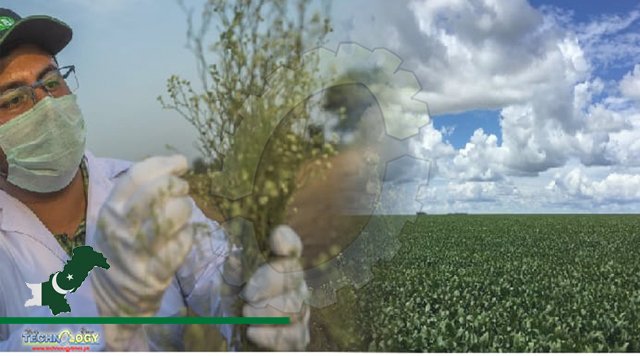Biological control of Parthenium, Parthenium is a highly destructive weed, crossing continents and, the weed is spreading rapidly in both rural and urban landscapes in the country.

Parthenium is highly-invasive due to its prolific seed production, flower production within four weeks of germination, tolerance to varying climatic conditions, and the production of allelochemicals that affect the growth of nearby plants, said Prof. Dr. Iqrar Ahmad Khan, Vice Chancellor, University of Agriculture Faisalabad (UAF) at an international seminar at UAF. biological control of Parthenium, UAF in collaboration with CABI Regional Bioscience Centre Pakistan organized an International Seminar on Biological Control of Parthenium hysterophorus in Pakistan using stem boring weevil (Listronotus setosipennis). Dr Iqrar Ahmad Khan stressed on the scientists to come up with novel ideas and solutions to cater the challenges of agriculture along with awareness / outreach activities to disseminate the findings and outcome of research to the farming community. Dr. Philip Weyl, Weed Biocontrol Specialist from CABI Switzerland during his talk said that Listronotus is a natural enemy of parthenium, from the weed’s native range of Central America. Listronotus is a nocturnal weevil that lays its eggs primarily in the flowers of parthenium where newly hatched larvae tunnel into the stem and continue to feed, eventually exiting at the base of the stem to pupate in the soil. Several larvae feeding in the stem can kill parthenium rosettes and mature plants.
Pro-Vice Chancellor Prof Dr Anas Sarwar Qureshi called for innovative approaches to address the issue of the agricultural sector. He said that excessive usage of chemicals on crops was creating health and environmental hazards. He said that adoption of latest scientific trends was the need of the hour to cope with agricultural challenges at national level. He said the agriculture sector was directly linked to poverty alleviation. Chairman Entomology UAF Prof Dr Sohail Ahmad highlighted the importance of research needed around the biocontrol of parthenium and other invasive weeds. He said that the country faced the catastrophe due to heavy floods in which we have lost the vast range of agriculture. He said that the university had mapped out a comprehensive plan to rehabilitate the sector. Abdul Rehman from CABI highlights that keeping in view the destructive impacts of parthenium weed; CABI initiated a biological control programme in Pakistan in 2017. For this purpose, biological control of Parthenium, CABI’s established a new quarantine laboratory at its Rawalpindi centre in Pakistan to enhance its capabilities to manage parthenium weed. The new quarantine facility allowed scientists to investigate a range of biological control options including the stem boring weevil Listronotus setosipennis. The quarantine facility compliments the comprehensive national action plan, launched in October with a focus on research, development and communication, by adding greater capacity for scientists to investigate the potential for existing and new biological controls prior to release in the field.
Source: This news is originally published by brecorder